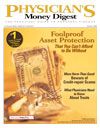Publication
Article
Physician's Money Digest
Think Twice Before Cashing Out Your Savings
Author(s):
When you switch jobs—and more and moredoctors are doing just that—one of the mostimportant financial decisions you maybe faced with is what to do with themoney in your 401(k) plan. While itmay be tempting to withdraw thatmoney and use it to cover otherexpenses, doing so could have verydetrimental effects on your overallfinances. Unfortunately, studies (eg,Hewitt Associates LLC, July 2005)have shown that nearly half of workersdo cash out of their 401(k) plans whenthey leave a job.
In addition to depriving yourself ofvaluable retirement savings, early cashoutscan subject you to hefty state andfederal income taxes. You may also facean early withdrawal penalty of 10%,reducing the value of your hard-earnedsavings even more. So, if you find yourselfin the position of changing jobs, youmay be wondering what your optionsare for your retirement plan funds.
Consider a Rollover
Generally, you have four alternativesfor handling the assets in yourformer employer's retirement plan.Your options include: rolling them intoan IRA; taking a cash distribution;leaving the assets in the plan; or movingthem to a new employer's plan.We'll take a brief look at each of thesepossible strategies.
If you're changing jobs or retiring,your best bet is usually to roll overyour 401(k) assets into an IRAaccount. By doing so, you retain thetax-deferred growth potential of yourinvestments. In addition, you canmaintain all of your IRAs in the sameplace, making it easier to manage yourretirement assets and analyze youroverall asset allocation.
Moreover, an IRA offers the additionalbenefit of giving you access toyour money when you need it. Forexample, if you lose a job due todownsizing or some other reason, youmight not be able to draw an incomestream from retirement plan assets leftwith a former employer. With an IRA,you have the flexibility to determinehow much income you need, and youcan take withdrawals when you want(taxes and IRS penalties may apply).
Avoid Financial Erosion
Cashing out should generally beconsidered a last resort. If you withdrawall your funds each time youchange jobs, you'll systematicallyerode one of your principal sources ofretirement income. To illustrate, withlump sum distribution, on top ofincome taxes and IRS penalties youmay be subject to, your employer willalso be required to withhold 20% ofthe taxable amount of your distributionand send it to the IRS as a prepaymentof the taxes that will be due. Asyou can see, cashing out is not themost desirable option.
Leaving your assets in your formeremployer's plan may be an optionthat's available to you, but doing socould create complexities in managingyour investments. Keep in mind youwill be limited to the plan's investmentalternatives, and your employer willalso control when and how you gainaccess to your retirement savings in thefuture. Leaving the assets where theyare requires no action on your part,but it may not be worth the potentialhassles it could create.
Finally, you may be able to moveyour retirement plan savings into anew employer's plan when you changejobs. However, doing so may involvemany of the same benefits and drawbacksof leaving your money in a formeremployer's retirement plan. You'llneed to make sure your new employer'splan permits transfers or rolloversfrom other types of plans before youdecide to go that route.
Joseph F. Lagowski is vice president, investments,and a financial consultant with AGEdwards in Hillsborough, NJ. He welcomesquestions or comments at 800-288-0901, orvisit www.agedwards.com. This article wasprovided by AG Edwards & Sons, Inc, member SIPC.
